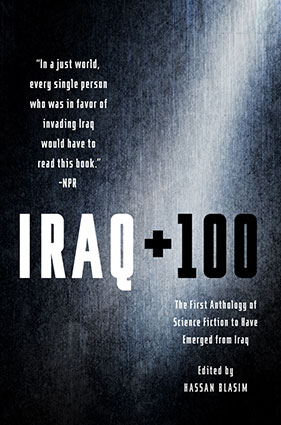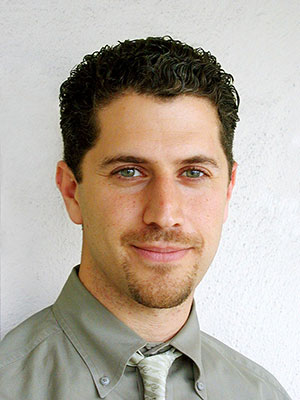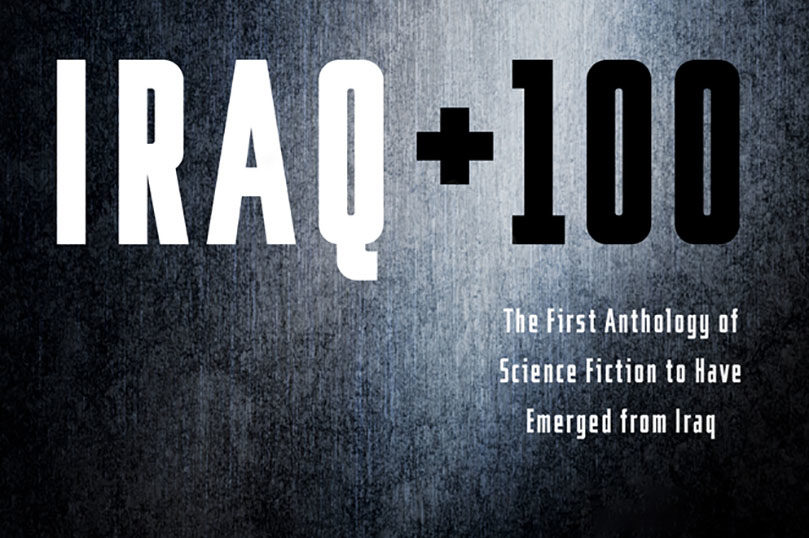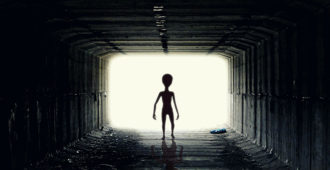opens in a new window From contributor Anoud, author of “Kahramana”
From contributor Anoud, author of “Kahramana”
I didn’t think too much about Sci-Fi’s absence from Arabic literature or the fact that I was quite ignorant in Arabic Sci-Fi until I was approached to contribute to Iraq + 100. I’d read Jules Verne’s Journey to the Centre of the Earth as a child, as well as superhero comics translated into Arabic, but as an adult, I can only recall reading Orwell’s 1984 and Ahmed Saadawi’s Frankenstein in Baghdad in that genre. You must have noticed by now that, with the exception of Saadawi, none of these titles are Arabic.
The debate in Arab media about the lack of Sci-Fi in Arab literature attributes it to the Arab world hitting a slump when it comes to scientific advances and inventions in the 20th century, in comparison to other parts of the world. Stories of violence and ongoing conflict stomp science when it comes to news headlines. Some Arab writers blame it on religious taboos where—in some countries—imagination offends the clergy as a defiance of nature, a challenge to god. I remember when I was 8, my school teacher in Baghdad told us that the NASA “Challenger” space shuttle exploded because NASA were challenging god. My parents snickered when I told them but you get the idea.
Since getting involved with Iraq + 100, I have been making more of an effort to explore this genre in contemporary Arabic fiction. My reading list includes Utopia by Ahmed Khaled Towfik, published in 2008, and Noura Al Noman’s Ajwan, which won the 2013 Etisalat Award for Young Adult Fiction.
When asked to contribute to the anthology I struggled. It was just too much headspace and I didn’t know where to start. Normally I look at things I’ve lived or seen and dissect them. I can paint a vivid picture of sights, smells, and sounds of a market place in Baghdad, but ask me to imagine it with time travel, aliens, a post apocalypse and I’d not be able to get past that first four lines. I felt strange when I read some of the other writers’ contributions like “Kuszib,” “Nujefa” or “Baghdad Syndrome”. It was a good kind of strange. I’d never imagined Iraq that way and it was as if the other writers just opened up a new portal into Iraq for me, and it was kind of exciting. I find my story “Kahramana” as more futuristic than full on Sci-Fi, if that makes sense.
I’m optimistic that with a little more nourishment more Iraqi writers will turn to Sci-Fi, fantasy, and magical realism. Both as a way to take a break from our miserable realities, and as a way to safely mock and critique the status quo and those in power without seeming too obvious. I’m glad Iraq + 100 started this and I’m both eager and terrified of how the Iraqi readers will respond to the anthology. Will we excite? Offend? Both? Time will tell.
opens in a new window From contributor Ibrahim Al-Marashi, author of “Najufa”
From contributor Ibrahim Al-Marashi, author of “Najufa”
Contributing to Hassan Blasim’s project Iraq + 100 appealed to me, given I’m Iraqi-(American), a historian of sci-fi, and a consumer of sci-fi as well.
As a historian, I was intrigued by Hassan’s lament in the introduction that there is not a strong science fiction and fantasy literary tradition in the modern Middle East. This dearth of genre fiction is surprising given the history of the region. One Thousand and One Nights, the quintessential fantasy collection, was first compiled and published in the Middle East. I also found elements of proto-speculative fiction in the works of the Sufi scholar Ibn Arabi from Murcia (today’s Spain). In his Futuhat al-Makiyya, written around 1238, he describes his travels to “vast cities (outside earth), possessing technologies far superior than ours.”
I have long been fascinated by modern works of science fiction and fantasy as the genre developed in English. H.G. Wells’ War of the Worlds was a commentary on the British role of the extermination of the local population of Tasmania, while the Godzilla franchise and the post-apocalyptic genre of Japanese manga, such as Akira, are imaginative spaces to deal with real trauma: the dropping of the atomic bombs on Hiroshima and Nagasaki in 1945.
My contribution to this anthology is “Najufa,” a story based on my first trip to my family’s ancestral city of Najaf as an adult with my father and mother in 2010, the site of the shrine of Imam Ali. My use of droids in my story was inspired by the fact that cell phones are not allowed within the confines of any shrine, since terrorists use cell phones to detonate explosives remotely. Visitors and pilgrims have to check their cell phones outside the shrine, like a coat check. Within the Najaf shrine I remembered how the younger pilgrims became fidgety, anxious to see if they had any missed calls or texts. I felt a disconnect between the spirituality of the place and something as mundane as worrying about a missed call. This phenomenon is no different from life anywhere else in the world. We are living in a techno-addicted world. But in Iraq, whether it is a terrorist or a pilgrim, the phone had become an extension of ourselves, and it was in Najaf that I realized we are essentially cyborgs, human-techno hybrids, where the phone might as well be an extension of ourselves.
My story was also inspired by the writer Philip K. Dick’s Do Androids Dream of Electric Sheep (made into the film Blade Runner), and the French thinker Jean Baudrillard, whose oeuvre provided the inspiration for the Matrix franchise. I found those works bring up philosophical issues of how one determines reality in an age of digital and virtual reality. My story sought to bring our current techno-phobias, and combine them with Iraq’s real problems that began after the 2003 invasion by U.S. forces.
Collectively, the authors of Iraq + 100 project their ideas into Iraq’s future, which highlights Iraq’s reality in the present. That is what attracts me to speculative fiction. While as a genre it is escapist in nature, it simultaneously brings our current reality into greater focus. Sci-fi reveals our anxieties of the convergence between science, automated realities, and what it means to be human. Science fiction is a reflection of our socio-political facts.
Order Your Copy
opens in a new window opens in a new window
opens in a new window opens in a new window
opens in a new window opens in a new window
opens in a new window opens in a new window
opens in a new window opens in a new window
opens in a new window







Comments are closed.
Leave a Reply